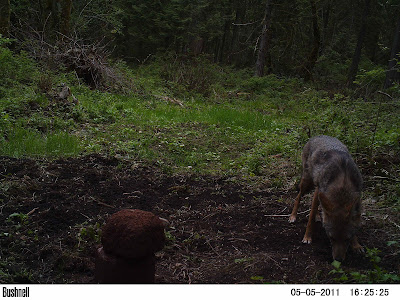Blacktail deer, Blacktail bucks, Food Plots, Hunting, Whitetail deer, Whitetail Bucks, Mule Deer, Mule Deer Bucks, Deer
Tuesday, June 19, 2012
Day and Night
Sunday, June 10, 2012
Potential Prospect
These pictures were taken of the same buck over a one month period. He's roughly a three to four year old buck even though he looks like a two year old. What's interesting about Black-tail deer in Washington is that fawns can be born early and late in the year. If they are born late they might not produce antlers until they reach two, at that point they will be just a spike. I have several pictures of a fawn born late previous year and it just started to produce antlers. The antlers have yet to pop through the skin.
This makes aging black-tail deer unique because based on antler size and points this buck would appear to be two years old. Body size also helps solve the mystery of age, but body size and antler size vary in different regions of Washington. The body size in the upper Kitsap Peninsula is greater and the antler size is definitely lacking. Truly trophy sized antlered bucks are highly sought after and extremely difficult to find. Personally I have seen trophy whitetail and mule deer, but only one black-tail buck.
This makes aging black-tail deer unique because based on antler size and points this buck would appear to be two years old. Body size also helps solve the mystery of age, but body size and antler size vary in different regions of Washington. The body size in the upper Kitsap Peninsula is greater and the antler size is definitely lacking. Truly trophy sized antlered bucks are highly sought after and extremely difficult to find. Personally I have seen trophy whitetail and mule deer, but only one black-tail buck.
Wednesday, June 6, 2012
Food Plot Brings in Predators
The interesting thing about creating this food plot is that you often get unintended visitors. The bears are done hibernating and are looking for easy food sources. Throughout the month of May I have taken over three hundred pictures of bears. Several coyotes have also started investigating the food plot looking for an easy meal. I have rarely seen a coyote like this during the day, they don't hang around for long but at night they are extremely vocal and drive our dogs crazy.
 |
| Beautiful coyote, great colors typical of Washington. |
 |
| This brute has eaten more apples than I care to mention. |
 |
| Bear is looking at me as I approach the food plot. |
It wasn’t my intention to attract bears and coyotes to the plot but they visit the site every other day. I often get raccoons, possums and squirrels visiting as well. By far the squirrels and the bears are the most destructive guests because they will consume all the apples and destroy the food blocks. I have resorted to trapping the squirrels and relocating them to nearby neighborhoods. These grey squirrels are not native to Washington and I view them as pests. They will literally pee and eat on the same block for hours.
The
bears on the other hand I have just left alone, but as you can see encounters
do happen. The picture of the bear
standing up, happened
when I came to drop off apples. The bear was listening and watching me as I approached the plot. We had a good stare down, but as usual he turned tail and ran away. I have had many encounters with bears and only a few times have they been aggressive making bluff charges without provocation. On the other hand I have provoked them and engaged them in bluff charges it really depends on the bears sex and experience with humans.
when I came to drop off apples. The bear was listening and watching me as I approached the plot. We had a good stare down, but as usual he turned tail and ran away. I have had many encounters with bears and only a few times have they been aggressive making bluff charges without provocation. On the other hand I have provoked them and engaged them in bluff charges it really depends on the bears sex and experience with humans.
Subscribe to:
Comments (Atom)

